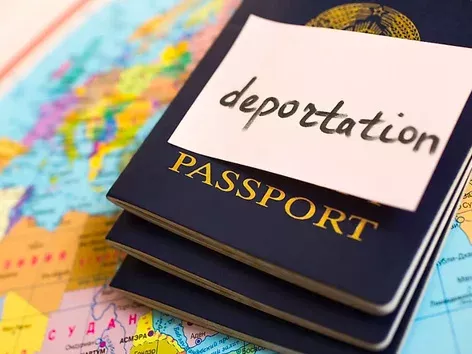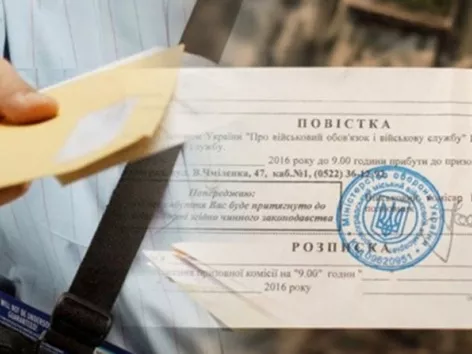When Ukrainian citizens can be deported from the EU: current rules and conditions

Ukrainian citizens can be deported from the European Union for various reasons. One of the most common reasons is violation of immigration laws. In addition, Ukrainian citizens can be deported for violating residence rules. Learn more about what you should know about deportation from the EU
Seeking asylum in EU countries due to the difficult international situation, many Ukrainians face the issue of immigration rules and possible circumstances that could lead to their deportation. This is reported by ukrainianingermany.de.
That is why it is important to know your rights and understand when you can be deported from the EU.
We will tell you when deportation can take place, what are the possible reasons for deportation of Ukrainian citizens and other important details in the article.
When can Ukrainian citizens be deported from the EU?
First of all, it is important to understand that deportation is an official act of removing a person from a country where he or she is staying illegally or for any other reason that is considered illegal.
Ukrainian citizens can be deported from EU countries for various reasons, including involvement in criminal activities or for reasons of national security.
Among the most common reasons are violations of immigration laws, such as the absence of a valid visa, residence permit, errors or inaccuracies in immigration documents, and working without the necessary permits.
To avoid misunderstandings and problems with immigration rules, it is useful to familiarize yourself with the relevant rules and laws of EU countries available on official web resources.
How does the deportation process work in the EU?
The deportation process in the European Union is complex and regulated by law. A person who is subject to deportation first receives an official notification of the intention to remove him or her from the country. They also have the right to appeal against the deportation decision. Detailed information on the administrative procedure can be found on the website of the European Asylum Support Office (EASO).
After the administrative and judicial proceedings, a final decision on deportation or cancellation is made. If the decision is made, the person is informed about the conditions and date of deportation.
Please note! Even during deportation, a person retains certain rights, such as the right to privacy and personal security. There are also organizations and resources that assist deportees in the process of reintegration upon return to their country of origin.
What is the difference between deportation and extradition?
Deportation and extradition are two different processes that take place in different contexts and have different legal bases and consequences.
Main differences and implications
Deportation is the process by which a person is expelled from a country for reasons related to a violation of immigration law. This process is usually initiated by the host country.
The deportation process is faster and less formal than extradition and is based on the immigration laws of the country.
Extradition is the process of transferring a person suspected or convicted of a crime from one country to another. This process is based on international agreements and applies to criminal cases.
The extradition process requires the involvement of judicial authorities and usually has more complex legal procedures.
Ukrainian citizens can be deported from EU countries for violating immigration laws.
The extradition of Ukrainians may occur in cases where a person is suspected or has already been convicted of an international crime.
Visit Ukraine on social media: Telegram | YouTube | Instagram | Facebook | Twitter | TikTok
Deportation to a country at war
The deportation of Ukrainian citizens to a country at war poses a complex legal and humanitarian challenge for the European Union. Some key aspects to consider are as follows:
The principle of non-refoulement
This principle, which is recognized in international refugee law, prohibits sending people back to countries where they would face persecution, torture or other serious harm. Given the situation in Ukraine, EU countries should carefully assess the risks before deporting.
Individual risk assessment
Before making a decision on deportation, an individual risk assessment should be carried out, taking into account the situation in the country of origin and the personal circumstances of the deportee. Particular attention should be paid to the protection of vulnerable groups.
Exceptions to the deportation rule
In some cases, EU countries may temporarily suspend deportations to countries in a state of war or serious humanitarian crisis. Alternatives, such as temporary asylum or refugee protection, should also be considered.
When considering deportation to a country at war, EU authorities should combine compliance with the law with respect for humanitarian principles. In the context of Ukraine, this means a thorough analysis of each case, taking into account individual circumstances and the broader international context. Ensuring the safety and dignity of deportees is not only a legal obligation, but also a moral obligation.
How to avoid deportation to Ukraine?
In order to avoid the risk of deportation and ensure legal stay in the European Union, it is recommended to follow several important steps:
Comply with immigration laws
Make sure that all your documents are in order, including a valid passport, visa or residence permit. Regularly check the validity of these documents and update them in time to avoid problems with immigration regulations.
Avoiding criminal activity
It is forbidden to engage in any activity that could be considered a crime. Even minor offenses can lead to serious problems with the law and potential deportation.
Using legal assistance
If you have any concerns or legal problems, seek the help of qualified lawyers specializing in immigration law. Use resources and advice provided by non-governmental organizations, embassies, or local immigrant support centers to get the help and advice you need.
If you need advice on the above issues, you can always contact Visit Ukraine's lawyers for advice. Our professional staff will be able to help you solve various problems using an individual approach. You can arrange a consultation by following the link.
We remind you! Ukraine and the European Commission have agreed to extend temporary protection for Ukrainians in the EU. The status will be reviewed only after the security situation in the country improves. Learn more about the changes to temporary protection for Ukrainians in the EU here.
Want to know more? Read the latest news and useful materials about Ukraine and the world in the News section.
Ihor Usyk is the Head of Legal Department at Visit Ukraine
On the Visit Ukraine portal, you can get legal advice on migration law. Our lawyers will answer all your questions and, if necessary, help you collect, submit and receive the documents you need. You can order a specialist consultation or full legal support by following this link.
Our recommendation for a safe and comfortable trip:
Visit Ukraine Insurance - insurance for a safe stay abroad without unnecessary expenses;
Green Card - compulsory car insurance for traveling abroad;
Visit Ukraine Tickets - book tickets for buses, trains, and airplanes to/from Ukraine and between cities around the world;
Private Lawyer service - professional legal support on visa and migration issues;
Visit Ukraine Merch - buy patriotic clothing and accessories with worldwide delivery.
© 2018-2024, Visit Ukraine. Use, copying or reprinting of materials on this site is permitted only with a link (hyperlink for online publications) to Visit Ukraine.
All rights reserved.
Recommended articles
2 min
Finance
Ukrainians can receive financial assistance for renting housing in Poland: how to apply
Ukrainian citizens can receive financial assistance for renting housing in Poland through the "Step Home" program implemented by the Habitat for Humanity Poland charitable foundation. If you are looking for financial assistance for renting an apartment in Poland, the first step is to fill out the program's application form. Find out what you need to do
14 May. 2024
More details2 min
Popular
Demand for real estate in Ukraine has increased: is it more profitable to buy or rent?
Buying real estate has its advantages, such as the ability to live in your own home without restrictions, use real estate for investment purposes, and the possibility of securing a stable place to live in the future. However, renting can be more financially beneficial. Find out what the dynamics of housing prices and real estate purchases are now
14 May. 2024
More details2 min
Insurance
Insurance for entering Ukraine: who needs it and what rules apply?
Choosing and applying for an insurance policy are the main steps in preparing for a trip to Ukraine. This applies to every foreigner who plans to visit the country for private or business purposes. Find out more about the specifics of health insurance for foreigners in Ukraine in normal conditions and during martial law, as well as the available policies
05 Feb. 2025
More details1 min
Popular
Mobilization law to clarify business obligations: will there be calls at work?
The new law on mobilization, which comes into force on May 18, clarifies the obligations of businesses to notify employees liable for military service. Find out what this means and whether you will be served with calls at work
15 May. 2024
More details

